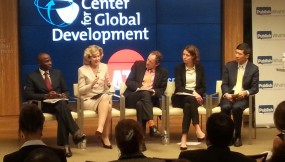The African
Media Initiative has announce the launch of its pan-African journalism contest.
Called the 2nd Zimeo Awards for Excellence in Media, the contest is open to professional
journalists in Africa reporting or writing for print, radio, TV and digital.
The announcement calls on all interested journalists to
reflect on their prospective entries and await details of submission dates and
procedures.
The competition will recognize journalism excellence in the
following categories:
1. Gender/Women's rights
2. The youth agenda
3. Maritime economy
4. Business and finance
5. Technology and digital journalism
6. Agriculture and food security
7. Health
8. Education
9. Peace and security
10. Energy & infrastructure
11. Extractive industries
12. African Union Agenda 2063
13. Conservation and climate change
14. Sustainable Development Goals Reporting
15. Sport/ economics, culture/sports management
2. The youth agenda
3. Maritime economy
4. Business and finance
5. Technology and digital journalism
6. Agriculture and food security
7. Health
8. Education
9. Peace and security
10. Energy & infrastructure
11. Extractive industries
12. African Union Agenda 2063
13. Conservation and climate change
14. Sustainable Development Goals Reporting
15. Sport/ economics, culture/sports management
The call for entries will be issued in June 2016 and
journalists are encouraged to present either single stories/articles or
thematic packages in the following languages, English, French, Portuguese,
Arabic and Kiswahili.
A panel of independent judges will be looking for entries
which:
• Demonstrate a high quality of reporting/writing in terms
of originality, depth, rigour, research, investigative enterprise,
innovativeness, clarity, proper sourcing, fairness, accuracy, exhaustive
analysis of the context and background and an above average understanding of
the subject matter.
• Are data-driven and use creative digital tools like mapping, crowdsourcing and visualization to help tell the story.
• Communicate the topic in a way that makes the story relevant and engaging to audiences and that contains evidence of its likely social impact or benefit to society.
• Provide, where possible, a pan-African perspective.
• Are multi-sourced.
• Are data-driven and use creative digital tools like mapping, crowdsourcing and visualization to help tell the story.
• Communicate the topic in a way that makes the story relevant and engaging to audiences and that contains evidence of its likely social impact or benefit to society.
• Provide, where possible, a pan-African perspective.
• Are multi-sourced.
Launching the contest, AMI CEO Eric Chinje said: “When we
launched this contest last year, we were pleasantly surprised by the huge
volume of entries and we’re hoping this year won’t be any different. The
contest is taking a slightly different characteristic as it is now inviting
Kiswahili entries, following strong recommendations by journalists for its
inclusion.”
The contest’s judging coordinator, Wangethi Mwangi, said:
“As with last year’s, we’ll constitute judging panels to address the different
regional and language groups and plan to maintain the highest standards of fairness
in the judging process.
Further enquiries should be directed at Justus Machio,
Communications and Outreach Assistant at the African Media Initiative via
email: jmachio@africanmediainitiative.org.



